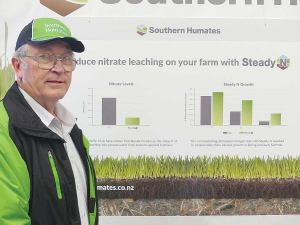Geopolitical shifts drive fertiliser market volatility – Ravensdown
According to Ravensdown's most recent Market Outlook report, a combination of geopolitical movements and volatile market responses are impacting the global fertiliser landscape.
 Malcolm Sinclair of Southern Humates says research has shown the benefits of his lignite-based humate products.
Malcolm Sinclair of Southern Humates says research has shown the benefits of his lignite-based humate products.
A man who bought an opencast Southland lignite mine 18 years ago no longer sells the coal for fuel, but sings its praises as stock food, fertiliser and soil conditioner.
Malcolm Sinclair’s Southern Humates company quarries and powders lignite into products known as humates – including a stock feed and straight humate used as fertiliser. It also provides raw material to other suppliers, such as human dietary supplements.
Lignite is a soft brown coal, produced by compression of organic matter, but is geologically young and regarded as half-way between peat and hard coal.
That means it remains high in biologically-active humic and fulvic acids – although its low heat and high carbon dioxide output when burnt make it no longer welcome as fuel.
Sinclair has been producing humates for seven years.
Speaking on his stand at the Southern Field Days at Waimumu, he explained that soils ideally have a 50:50 balance of fungi and bacteria. But Sinclair says fungi levels are naturally low in New Zealand soils and further depressed by farming methods of added phosphates and nitrates.
“The humic acid feeds the fungi and brings them back,” he told Rural News.
Although humate use remains controversial in some quarters, it has wide acceptance in organic, regenerative and biological farming.
Southern Humates is BioGro organically-certified and sells from Whangarei to the Bluff, he says.
Sinclair says humates give the soil the ability to hold on to nutrients by a process known as chelation.
Sinclair says that as a stock feed, humate promotes bacteria in the gut, to sort out spring scours by restoring the breakdown of the mucous lining.
He says the animals regulate their own dosage depending on their needs.
“We just feed it ad-lib. One day they’ll eat a lot, next day they won’t eat a lot at all.
“Animals are like that - sheep eat soil to get the nutrients and minerals out of it.”
Tickets are now available for Beef + Lamb New Zealand’s (B+LNZ) Out the Gate, returning from 19-21 May 2026 at Te Pae, Christchurch.
Dairy Women's Network (DWN) is welcoming AgriHealth as a new partner.
Northland Field Days patron Ross Newlove remembers the inaugural field days he attended 40 years ago.
Southland farmer Murray Donald has been appointed as chair of Safer Farms, the industry-led organisation focused on reducing harm, injuries and fatalities in the agricultural sector.
National Lamb Day returns this Sunday, 15 February, with Beef + Lamb New Zealand Inc calling on Kiwis to fire up their barbecues and celebrate the people and the product that put New Zealand on the world map.
When it comes to arranging the sound system at Northland Field Days, no one does it better than Colin Finlayson.

OPINION: Here w go: the election date is set for November 7 and the politicians are out of the gate…
OPINION: ECan data was released a few days ago showing Canterbury farmers have made “giant strides on environmental performance”.